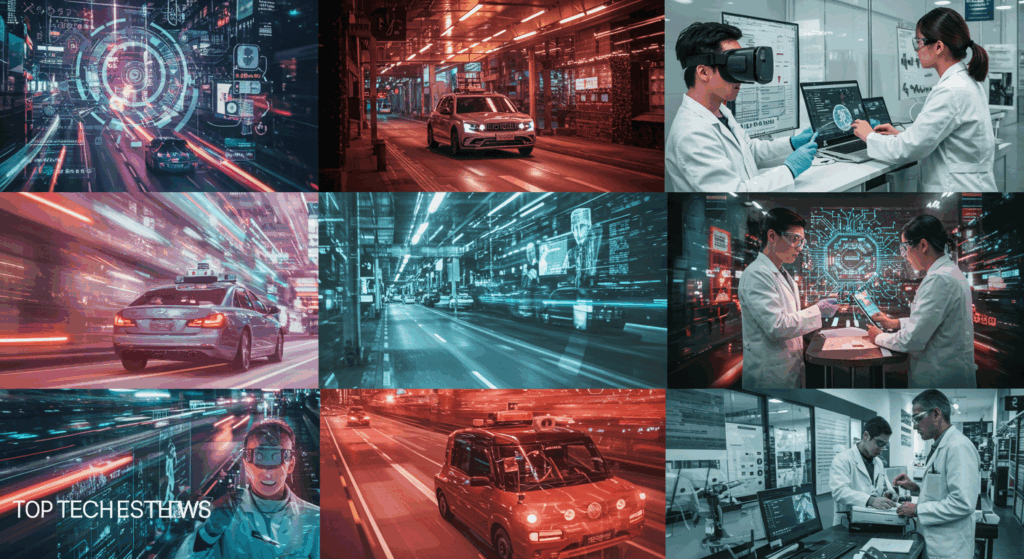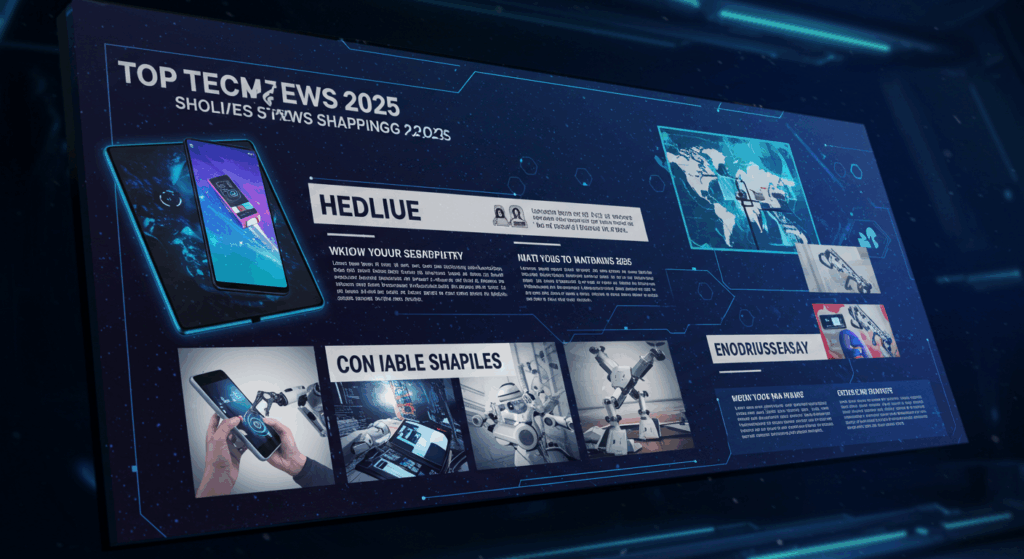As we dive into 2025, the tech landscape is buzzing with transformative innovations and trends that promise to redefine industries, societies, and individual lives. From breakthroughs in artificial intelligence to advancements in sustainable technology, the year is poised to deliver groundbreaking developments. This blog post explores the top tech news stories shaping 2025, offering a glimpse into the future of technology and its far-reaching implications.
1. AI Evolution: Beyond Human-Like Intelligence
Artificial intelligence (AI) continues to dominate tech headlines in 2025, with systems like Grok 3 pushing boundaries in reasoning, creativity, and accessibility. AI models are no longer just tools for automation; they’re becoming collaborative partners in fields like medicine, education, and creative arts. Recent advancements have enabled AI to tackle complex problems with unprecedented accuracy, such as real-time medical diagnostics and personalized learning plans.
One standout story is the rise of AI-driven “think modes,” where systems take extra time to process queries deeply, mimicking human-like deliberation. These modes, available in platforms like Grok 3, enhance decision-making in critical applications, from legal analysis to scientific research. Additionally, AI’s integration into everyday devices—smartphones, wearables, and home assistants—has made it more accessible, with voice and multimodal interfaces becoming standard.
However, ethical concerns remain a hot topic. Debates around AI bias, privacy, and job displacement are intensifying, with governments worldwide drafting stricter regulations. In 2025, expect more discussions on balancing innovation with accountability, as AI becomes a cornerstone of global economies.
2. Quantum Computing Leaps Forward
Quantum computing is no longer a distant dream but a tangible reality in 2025. Companies like IBM, Google, and startups like Rigetti Computing have made significant strides, with quantum processors now capable of solving problems previously deemed intractable. This year, quantum computers are being used in practical applications, such as optimizing supply chains, accelerating drug discovery, and enhancing cybersecurity.
A major news story is the breakthrough in error correction, a long-standing challenge in quantum computing. New algorithms have reduced error rates, making quantum systems more reliable for commercial use. For instance, pharmaceutical companies are leveraging quantum simulations to model complex molecules, slashing years off drug development timelines.
The race for quantum supremacy is also heating up geopolitically. Nations are investing heavily in quantum research, viewing it as critical to economic and military dominance. In 2025, expect increased collaboration between governments, academia, and private sectors to scale quantum technologies, alongside debates about global standards and security protocols.
3. Sustainable Tech: Green Innovation Takes Center Stage
Sustainability is a driving force in 2025’s tech narrative, with innovations aimed at combating climate change gaining momentum. Solar and wind energy technologies have seen remarkable improvements, with next-generation solar panels achieving efficiencies above 30%. Meanwhile, advancements in battery storage—particularly solid-state and sodium-ion batteries—are revolutionizing electric vehicles (EVs) and grid storage, making renewable energy more reliable and affordable.
A notable story is the rise of carbon capture technologies. Startups are deploying AI-powered systems to capture and store CO2 at scale, with pilot projects showing promising results in industrial hubs. Additionally, circular economy models are reshaping tech manufacturing, with companies like Apple and Samsung committing to 100% recycled materials for their devices by 2030.
Consumer demand for eco-friendly products is also driving innovation. In 2025, expect to see more biodegradable electronics, energy-efficient chips, and “smart” homes optimized for minimal environmental impact. Governments are supporting these efforts with incentives, but challenges like high costs and scalability remain hurdles to widespread adoption.
4. The Metaverse Matures: Virtual Worlds Go Mainstream
The metaverse, once a buzzword, is becoming a practical reality in 2025. With improved virtual reality (VR) and augmented reality (AR) hardware, immersive digital worlds are now accessible to millions. Companies like Meta and Epic Games are leading the charge, creating platforms where users can work, socialize, and play in seamless virtual environments.
A key story is the integration of the metaverse into professional settings. Virtual offices are replacing traditional ones for remote teams, with AI avatars facilitating meetings and collaborations. In education, schools are adopting AR for interactive learning, from virtual science labs to historical reenactments. Gaming remains a major driver, with titles like Fortnite evolving into social hubs where players attend concerts and events.
However, the metaverse faces challenges, including privacy concerns and the digital divide. Ensuring equitable access and preventing data misuse are critical issues as adoption grows. In 2025, expect regulatory frameworks to emerge, alongside innovations in lightweight, affordable VR/AR headsets to broaden access.

5. Space Tech: The New Frontier Expands
Space technology is soaring in 2025, driven by private companies and international collaborations. SpaceX’s Starship is making regular lunar trips, laying the groundwork for permanent moon bases by the end of the decade. Meanwhile, NASA’s Artemis program is advancing, with plans for a lunar gateway to facilitate deep-space exploration.
A major headline is the commercialization of space. Companies like Blue Origin and Rocket Lab are offering affordable satellite launches, enabling startups to enter the space economy. Applications include global internet coverage via satellite constellations, real-time climate monitoring, and asteroid mining feasibility studies.
Public interest in space tourism is also surging. In 2025, suborbital flights are becoming more accessible, with prices dropping as competition intensifies. However, environmental concerns about rocket emissions and space debris are prompting calls for sustainable practices in the industry.
6. Cybersecurity in the Age of AI and Quantum
As technology advances, so do the threats. Cybersecurity is a top concern in 2025, with AI-powered cyberattacks becoming more sophisticated. Hackers are using generative AI to create convincing phishing campaigns and deepfakes, challenging traditional defenses. In response, companies are deploying AI-driven security systems that detect and neutralize threats in real time.
Quantum computing is also reshaping cybersecurity. While quantum systems promise unbreakable encryption, they also threaten to crack existing cryptographic standards. In 2025, the race is on to develop quantum-resistant algorithms, with NIST leading efforts to standardize post-quantum cryptography.
High-profile data breaches continue to make headlines, underscoring the need for robust cybersecurity frameworks. Governments and corporations are investing heavily in zero-trust architectures and decentralized identity systems to protect sensitive data. For consumers, biometric authentication and blockchain-based solutions are becoming standard for secure transactions.
7. Biotech Breakthroughs: Health Tech Redefines Medicine
Biotechnology is transforming healthcare in 2025, with personalized medicine at the forefront. CRISPR-based gene therapies are now treating a range of genetic disorders, from sickle cell anemia to rare cancers. Meanwhile, AI-driven diagnostics are enabling earlier detection of diseases like Alzheimer’s and heart conditions, improving patient outcomes.
Wearable health tech is another major story. Smartwatches and biosensors are monitoring vital signs in real time, alerting users to potential health issues before they escalate. Companies like Apple and Fitbit are integrating AI to provide actionable health insights, turning wearables into virtual doctors.
Telemedicine is also expanding, with 5G networks enabling high-quality virtual consultations. In 2025, expect more regulatory support for telehealth, alongside innovations in robotic surgery and 3D-printed organs. However, ethical dilemmas around gene editing and data privacy remain contentious, sparking global debates.
8. The Rise of Autonomous Systems
Autonomous systems are reshaping industries in 2025, from transportation to agriculture. Self-driving cars are now common in urban areas, with companies like Tesla and Waymo expanding their fleets. These vehicles use advanced AI and sensor fusion to navigate complex environments, reducing accidents and congestion.
In agriculture, autonomous drones and robots are optimizing crop yields through precision farming. These systems monitor soil health, apply fertilizers, and detect pests with unparalleled accuracy. Similarly, logistics is seeing a boom in autonomous delivery, with drones and robots handling last-mile services in cities.
However, public trust and regulatory hurdles remain challenges. In 2025, expect ongoing discussions about safety standards and liability in autonomous systems, alongside efforts to integrate them into existing infrastructure.
9. 6G and Beyond: The Future of Connectivity
While 5G continues to roll out globally, 2025 marks the early stages of 6G development. Promising speeds up to 100 times faster than 5G, 6G aims to enable holographic communication, ultra-low latency, and seamless IoT integration. Research is focusing on terahertz frequencies and AI-driven network optimization.
A key story is the role of 6G in bridging the digital divide. Satellite-based 6G networks are being tested to provide high-speed internet to remote regions, supporting education and economic growth. However, concerns about infrastructure costs and electromagnetic radiation are sparking debates about deployment timelines.

10. Ethical Tech: The Push for Responsible Innovation
As technology permeates every aspect of life, ethical considerations are taking center stage in 2025. Issues like AI bias, data privacy, and digital equity are driving calls for responsible innovation. Tech giants are facing pressure to adopt transparent practices, while startups are prioritizing ethical frameworks to gain consumer trust.
A notable trend is the rise of “tech for good” initiatives. Companies are developing solutions to address social challenges, from AI-powered disaster response to blockchain-based systems for fair trade. In 2025, expect more collaborations between tech firms, NGOs, and governments to tackle global issues like poverty and climate change.
Conclusion
The tech stories of 2025 reflect a world at the cusp of transformation. From AI’s deepening integration to quantum leaps and sustainable innovations, these developments promise to reshape how we live, work, and connect. Yet, with great power comes great responsibility. As we embrace these advancements, addressing ethical, environmental, and societal challenges will be crucial to ensuring technology serves humanity’s best interests. Stay tuned as 2025 unfolds, bringing new breakthroughs and opportunities to the forefront.



